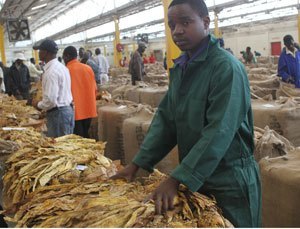
TOBACCO Industry and Marketing Board (TIMB) says tobacco growers should comply with the legislated planting dates to prevent the spread of diseases.
REPORT BY MOSES CHIBAYA
The caution comes amid indication that some growers, especially new farmers, were failing to destroy their stocks after harvesting.
TIMB chief executive officer, Andrew Matibiri said according to the Plant Pests and Diseases (Tobacco) regulations 1979, tobacco plants in the land should be destroyed before May 15 each year.
Apart from that, tobacco seed may not be sown before June 1 each year and it may not be planted into the land before September 1 annually.
Farmers are encouraged to end transplanting by the first week of December and destruction of seedbeds must be achieved by December 31.
Matibiri said farmers that are not conforming to the legislated dates risked being fined.
“Farmers that are not complying will be charged a fine of US$100 per every hectare of stalks not destroyed. We are educating farmers on the importance of abiding by the legislated dates,” he said.
- Chamisa under fire over US$120K donation
- Mavhunga puts DeMbare into Chibuku quarterfinals
- Pension funds bet on Cabora Bassa oilfields
- Councils defy govt fire tender directive
Keep Reading
Gibson Mhaka, an experienced tobacco grower at Hunter’s Lodge in Karoi, said action must be taken against tobacco growers that failed to abide by the regulated dates.
“TIMB must punish farmers that are failing to respect these dates. We are now encountering an outbreak of diseases which we can avoid. It is the duty of every farmer to protect our industry. I want to encourage all the farmers to report to TIMB farmers that are not following the dates,” Mhaka said.
According to experts, aphids are the main transmitter of diseases, especially bushy-top and the potato virus Y (PVY).
Early planting, adherence to legislated dates for sowing tobacco seed, planting seedlings out in the land, destroying used seedbeds and tobacco stalks are recommended as the most effective management options farmers can adopt against the aphid and diseases.
Tobacco is one of Zimbabwe’s largest exports accounting for a third of all foreign currency earnings, along with gold and minerals.
Almost 99% of the crop was exported to 69 different countries.











